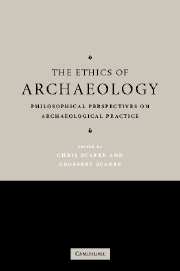Book contents
- Frontmatter
- Contents
- List of contributors
- Acknowledgements
- 1 Introduction
- PART I THE OWNERSHIP OF CULTURAL OBJECTS
- 2 Cultures and the ownership of archaeological finds
- 3 Who guards the guardians?
- 4 Is culture a commodity?
- 5 Moral arguments on subsistence digging
- PART II ARCHAEOLOGISTS AND THE LIVING
- PART III ARCHAEOLOGISTS AND THE DEAD
- PART IV THE COMMON HERITAGE OF HUMANKIND?
- References
- Index
3 - Who guards the guardians?
Published online by Cambridge University Press: 05 June 2012
- Frontmatter
- Contents
- List of contributors
- Acknowledgements
- 1 Introduction
- PART I THE OWNERSHIP OF CULTURAL OBJECTS
- 2 Cultures and the ownership of archaeological finds
- 3 Who guards the guardians?
- 4 Is culture a commodity?
- 5 Moral arguments on subsistence digging
- PART II ARCHAEOLOGISTS AND THE LIVING
- PART III ARCHAEOLOGISTS AND THE DEAD
- PART IV THE COMMON HERITAGE OF HUMANKIND?
- References
- Index
Summary
There was a time when collecting artistic and archaeological artefacts was widely regarded in a very positive light. Both private and public collectors saved objects so that the public could experience those objects and the scholarly community study them. A good indication is the title of a recent book (published by the Hayward Gallery) by the British National Art Collections Fund which provides funds for museums in Britain to buy works of art. It is called Saved! But gradually this activity came to be questioned. Much of the material in museums was acquired by dubious methods, it has been argued, and is presented in patronising ways. For example, ‘primitive’ communities are presented through their artefacts as exotic and we often treat important religious symbols as just things to be gaped at as representatives of a very alien way of life. We may even display their dead as items for public entertainment and study in ways that would lead to questions were we to be dealing with corpses from our own culture. On the other hand, the recent von Hagens ‘Bodyworks’ display of dead bodies in a variety of poses suggests that breaking taboos in this area is a potent source of audience attraction. Even though the bodies come from people who have voluntarily consigned them for display, or so we are told, one might wonder what point is made by their manipulation into unusual poses and public display.
- Type
- Chapter
- Information
- The Ethics of ArchaeologyPhilosophical Perspectives on Archaeological Practice, pp. 32 - 45Publisher: Cambridge University PressPrint publication year: 2006
- 4
- Cited by



